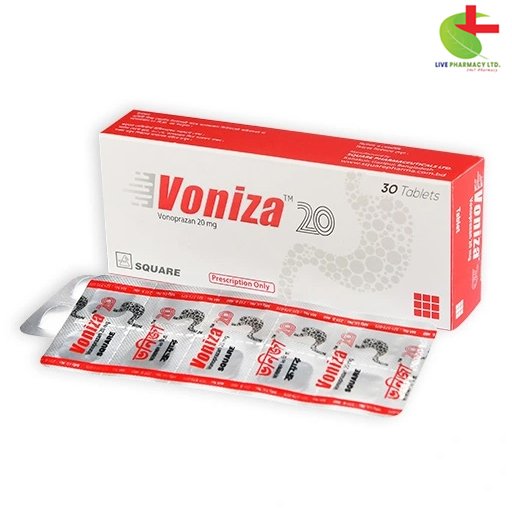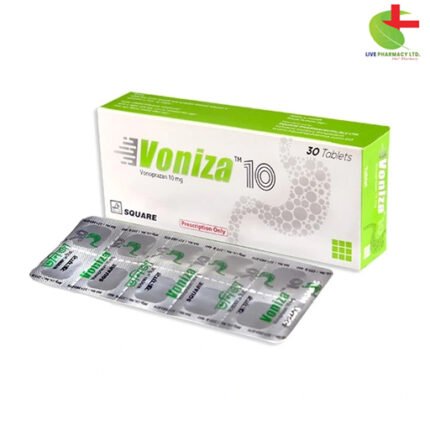Voniza 20
100.00৳ Strip
- Introducing Voniza: A powerful solution for gastric ulcers, reflux esophagitis, and ulcer prevention during aspirin or NSAID therapy.
- Potassium competitive acid blocker: Voniza effectively inhibits stomach acid production, offering relief and protection.
- Flexible dosing options: Tailored treatment plans ensure optimal results for each patient’s needs.
- Convenient administration: Voniza’s ease of use enhances patient compliance and treatment efficacy.
 Brand
Brand
|
Square Pharmaceuticals PLC |
|---|---|
 Generics
Generics
|
Vonoprazan |
Indications
Voniza serves as a remedy for a range of conditions, including:
- Gastric ulcers
- Duodenal ulcers
- Reflux esophagitis
- Prevention of recurrence of gastric or duodenal ulcers during low-dose aspirin administration
- Prevention of recurrence of gastric or duodenal ulcers during NSAID administration
Additionally, it acts as an adjunct to Helicobacter pylori eradication in the following cases:
- Gastric ulcers
- Duodenal ulcers
- Gastric mucosa-associated lymphatic tissue (MALT) lymphoma
- Idiopathic thrombocytopenic purpura
- The stomach after endoscopic resection of early-stage gastric cancer or Helicobacter pylori gastritis
Pharmacology
Vonoprazan, a potassium competitive acid blocker (P-CAB), operates without the need for acid activation. It inhibits H+, K+-ATPase in a reversible and potassium-competitive manner. This potent medication resides on the acid production site of gastric parietal cells for an extended period, effectively hindering gastric acid production and preventing mucosal damage in the upper gastrointestinal tract.
Dosage
- For gastric ulcer and duodenal ulcer: The standard adult oral dose is 20 mg of Vonoprazan once daily for 8 weeks for gastric ulcer and 6 weeks for duodenal ulcer treatment.
- Reflux esophagitis: The typical adult oral dose is 20 mg of Vonoprazan once daily for a 4-week treatment period. If necessary, treatment duration can be extended up to 8 weeks.
- Maintenance therapy for recurrent reflux esophagitis: The oral dose is 10 mg of Vonoprazan once daily, with the option to increase to 20 mg if efficacy is inadequate.
- Prevention of ulcer recurrence during low-dose aspirin or NSAID administration: The usual adult dose is 10 mg of Vonoprazan once daily.
- Adjunct to Helicobacter pylori eradication: A three-drug regimen, comprising Vonoprazan, amoxicillin hydrate, and clarithromycin, should be administered orally twice daily for seven days.
Administration
Vonoprazan can be taken irrespective of food intake or timing.
Contraindications
Vonoprazan is contraindicated in individuals:
- With hypersensitivity to Vonoprazan or any of its excipients
- Receiving atazanavir sulphate, nelfinavir, or rilpivirine hydrochloride.
Side Effects
Common side effects associated with Voniza include diarrhea, constipation, drug hypersensitivity reactions, hepatotoxicity, and gastrointestinal disturbances.
Pregnancy & Lactation
Use of Vonoprazan in pregnant or potentially pregnant women should be weighed against potential benefits. Administration to nursing mothers is generally discouraged.
Precautions & Warnings
Close monitoring of the disease course and minimal therapeutic usage are advised during treatment with Voniza. Long-term administration should be accompanied by regular observations such as endoscopy.
Use in Special Populations
- Elderly patients: Careful administration is recommended due to decreased physiological functions.
- Children: Voniza is not recommended for children and adolescents below 18 years of age.
- Renal impairment: Caution is advised, with avoidance in severe cases.
- Hepatic impairment: Avoid in moderate to severe cases.
Overdose Effects
While there’s no reported overdose experience, symptomatic and supportive treatment should be provided if necessary.
Therapeutic Class
Voniza belongs to the potassium competitive acid blocker class.
Storage Conditions
Store Voniza below 30°C in a cool, dry place, away from light, and out of reach of children.













Reviews
There are no reviews yet.